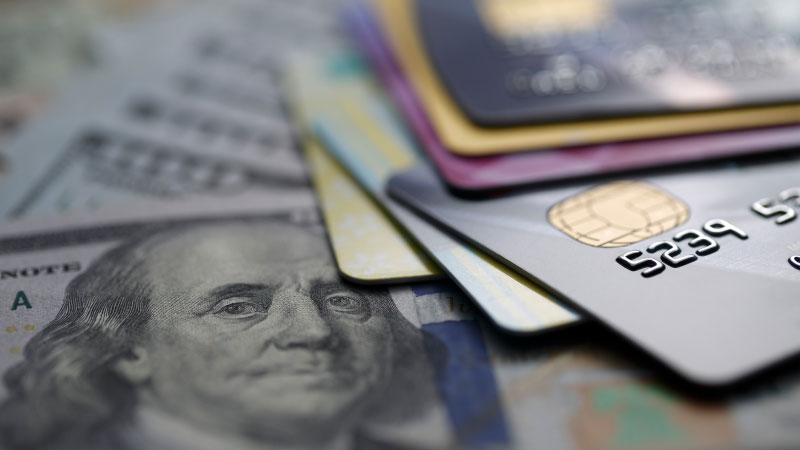
Financial Literacy: Why Money Management is Important
Learning how to manage your money is a vital life skill, but not one we’re necessarily taught. More often than not, it’s something we need to learn on our own, and it can be a humbling experience. But smart financial habits, big and small, can set you up for success later in life.
As your community financial partner, we take empowering those we work with seriously. We always want you to have the tools you need to make the right money management decisions for you. That’s why we put together this guide on everything you need to know about financial literacy to keep you on track and feeling confident in your fiduciary responsibilities. Let’s get started.
- What is Financial Literacy?
- How to Become Financially Literate
- Saving vs. Spending: Finding the Right Balance that Works for You
- How to Set a Budget (and Stick to It)
- Money Management for the Everyday Me
- Dealing with Debt
- Avoid Bad Financial Habits: Saving for Your Future Today
- How Community Banks are Your Financial Solutions Partner
What is Financial Literacy? (And Why You Should Care)

Financial literacy gives you the confidence in understanding all money management practices, whether saving, paying off debt, or investing. This, in turn, lets you put trust in yourself to make the right decisions regarding your money.
When you’re financially literate, you’re able to do things like:
- Increase your retirement savings with every raise.
- Maintain an emergency fund with three to six months’ worth of expenses, AND replenish it if you have to withdraw money.
- Understand how much you earn and spend, and use this knowledge to maintain a budget.
- Pay off your debt and avoid taking on new ones.
All and all, these skills will help you weather the ups and downs of life because you have a strong understanding of how to prevent and manage any financial issues should they arise.
How to Become Financially Literate

Now that we’ve answered the question “What is financial literacy?” you may be wondering how to achieve it. Knowing where to start when building that foundation can be a gray area.
According to a 2020 Council for Economic Education survey, 26 states and D.C. don’t require a personal finance class in high school. And not getting this knowledge early on can lead to a lifetime of insecurities if you’re not careful. In fact, a 2021 FINRA survey found that more than 60% of adults say thinking about their finances makes them anxious.
However, there are a lot of resources out there that make learning easy, such as:
- Free tools that can track your spending patterns or monitor your credit score. These can be provided by your bank or credit card company and will help you understand where you’re at.
- Utilizing any programs from your employer, such as financial counseling or an employee financial wellness program.
- Hiring a credit counselor or wealth manager to work with you to get a better grasp of your finances.
At First Seacoast Bank, we offer financial literacy classes for all ages, from schools to nonprofits. In these courses, we’ll review all things banking, including how and why to set up a bank account, how to apply for a loan, the power of saving, and creating a budget. We also show students why establishing good credit is so important.
Saving vs. Spending: Finding the Right Balance that Works for You

While there’s no golden ratio when it comes to saving vs. spending, there are a few general guidelines you can follow, like the 50/30/20 rule, where you spend 50% of your monthly income on needs, 30% on wants, and 20% on savings. This can help ensure that you have enough to cover the non-negotiables, like rent and utilities, while still giving you the freedom to enjoy life and have an emergency fund for those situations should they pop up. But that’s not the only thing your savings can be used for.
Having goals for your savings can be great motivation. Are you hoping to finally take that dream vacation you’ve been planning for? Or are you hoping to seriously tackle some of that credit card debt? Knowing the total costs and working backward to create attainable savings amounts ensures that you meet your goals in a realistic way. There are resources out there to help as well, whether it be an app like Digit or Acorns, or methods like the envelope savings challenge.
And while no one wants to keep track of their spending, it’s a necessary evil. How often are you going out to eat vs. making dinner at home? Are you keeping track of your online purchases, or does saving your card information to your favorite shops’ sites make the temptation hard to resist? We aren’t saying that you shouldn’t treat yourself, but it’s important to make sure you’re being smart about your spending habits and keep track of where your money is going.
When it comes to saving vs. spending, you want to ensure that you’re creating a plan that works for your financial situation. That’s where having a strong budgeting system can come in handy.
How to Set a Budget (and Stick to It)

Budgeting helps provide you with peace of mind, but can be daunting when you’re first starting. While many of us may associate it with a lack of freedom, knowing how to set a budget is all about creating a plan of where and how to spend your money so you can do the things you want and need.
Here are some of our favorite tips on setting a budget:
- Set short-, mid-, and long-term financial goals, whether saving up for your dream vacation or paying off your debt faster. Keep in mind that you don’t have to limit yourself to just one.
- Know where your income comes from, whether from a full- or part-time job, stocks and investments, or other passive forms. If you want to take it a step further, plan on using different incomes for different things.
- Take stock of your expenses (including monthly, quarterly, or annual ones) and your savings.
- Start planning before the start of the next month so you can go into it with confidence.
- Keep some buffer money for unexpected expenses.
- Factor in fun so you can take the pressure off yourself.
- Revisit and revise your budget regularly to ensure you’re using your money as effectively as possible.
Having the right bank can make all the difference, so ensure yours puts you and your needs first!
Money Management for the Everyday Me

Why is money management important? Simply put, it’s because it’s unavoidable. It teaches you how to practice saving money and/or getting out of debt. But beyond that, it can help you figure out ways to make your money work for you. One of the best ways to do so is to invest, and nowadays, it couldn’t be easier. There is a whole list of apps that will help you make strategic investments and help you get started. And, when you’re ready, hiring a financial advisor can go a long way toward helping you map out your financial future.
Financial or wealth advisors, like the ones at First Seacoast Bank, can help with money management projects like:
- Retirement Planning
- Portfolio Management
- Investment Strategies
- Insurance Strategies
- Business Retirement Plans
- College Planning
Dealing with Debt

A recent study from the Experian credit union found that the average American has $90,460 in debt. This can come in many forms, but some of the most common are credit cards, personal loans, mortgages, and student loans. At times, it’s inevitable. But paying off debt can be easy when you have the right plan in place.
The first thing you should do is take stock of all your debts, including three key details:
- The type
- The remaining balance
- And the interest rate
This will help you see the full picture of your financial situation, what your priorities should be, and how to construct a realistic plan.
From there, you can implement one (or more) of the following best practices for paying off debt:
- Pay more than the minimum each month if you have the budget to do so. This will help reduce the principal balance and, thus, the interest you accrue, saving you money in the long run.
- Pay off specific debts first, whether that be the most expensive or least expensive one. This way, you can get rid of “bad” debts (ones with higher interest rates, for example) or get the instant satisfaction of getting something off your record, respectively.
- Consolidate your debts under a new loan to get a lower interest rate, a lower monthly payment, and/or a shorter payoff period.
- Be smarter about your spending habits, and avoid spontaneous spending or overspending.
Avoid Bad Financial Habits: Saving For Your Future Today

Small habits can lead to the greatest financial success. That’s why it’s important to learn what the bad ones are and do better. Taking small steps to save for life’s big events early paves the way to a more prosperous future. Let’s talk about some of the most common for each.
Healthy Financial Habits and Best Practices
- Pay yourself first, whether putting money into your savings or adding to your retirement fund.
- Create a rainy day or emergency fund that you can use to cover unexpected expenses, like a change in employment, a car fix, or healthcare costs.
- Check your credit report at least once a year to ensure you know where you stand and that everything is accurate.
- Pay your bills on time, every time to help maintain (or even improve) your credit score. If possible, you can even automate your payments so you don’t have to keep track of what’s due and when.
- Understand your spending habits so you know where your money is going each month.
- Consider investing to grow your money, whether that be with the help of an app or a financial advisor.
- Try to live below your means to help save up money faster. This could mean selling things you don’t need, revisiting your subscriptions, or buying in bulk.
- Pay off your debt strategically, whether that be getting rid of the one with the highest interest rate or the lowest remaining balance first (as long as you continue to make regular payments on other forms).
Bad Financial Habits That Hold You Back
- Spending more than you should on nonessential items rather than purchasing more practical items (even if they are a want vs. a need). The same goes for shopping when you’re bored or not buying things used/secondhand.
- Adding to your credit card debt without making a concerted effort to reduce your balance.
- Not following your budget (or even creating one) and spending more than you should.
- Never setting aside emergency funds or constantly dipping into your savings.
- Not having your money work for you by investing in stocks or other forms of passive income.
- Having one bank account, which can make it hard to separate out your savings.
- Missing your monthly payments, whether for credit cards or utilities.
How Community Banks are Your Financial Solutions Partner

Community banks are a pillar of any area, helping to provide the support people need to confidently manage their finances. At First Seacoast Bank, we’ve made it our mission to put you first by providing the convenience and courtesy you need from a financial solutions partner. It’s at the heart of everything we do, whether offering personal banking options that let you manage your money in your own way or supporting you as you start the business you’ve always dreamed of.
We’re proud to have financial advisors on staff—something that sets us apart from others in the area—to help you develop smart money management strategies and implement creative solutions. This relationship is one that can serve you for years to come as well; we’re committed to providing you with timely, ongoing services.
This commitment extends outside of our doors as well. We believe that being a true member of the community means giving back whenever possible. We support locals, non-profit organizations, and businesses to help strengthen the areas we serve with programs like:
Whether you’re looking to open your first or new account, or looking to make a switch, we’d love to be your financial solutions partner. Visit one of our five locations throughout the Seacoast, give us a call, or send us a note to get started.
